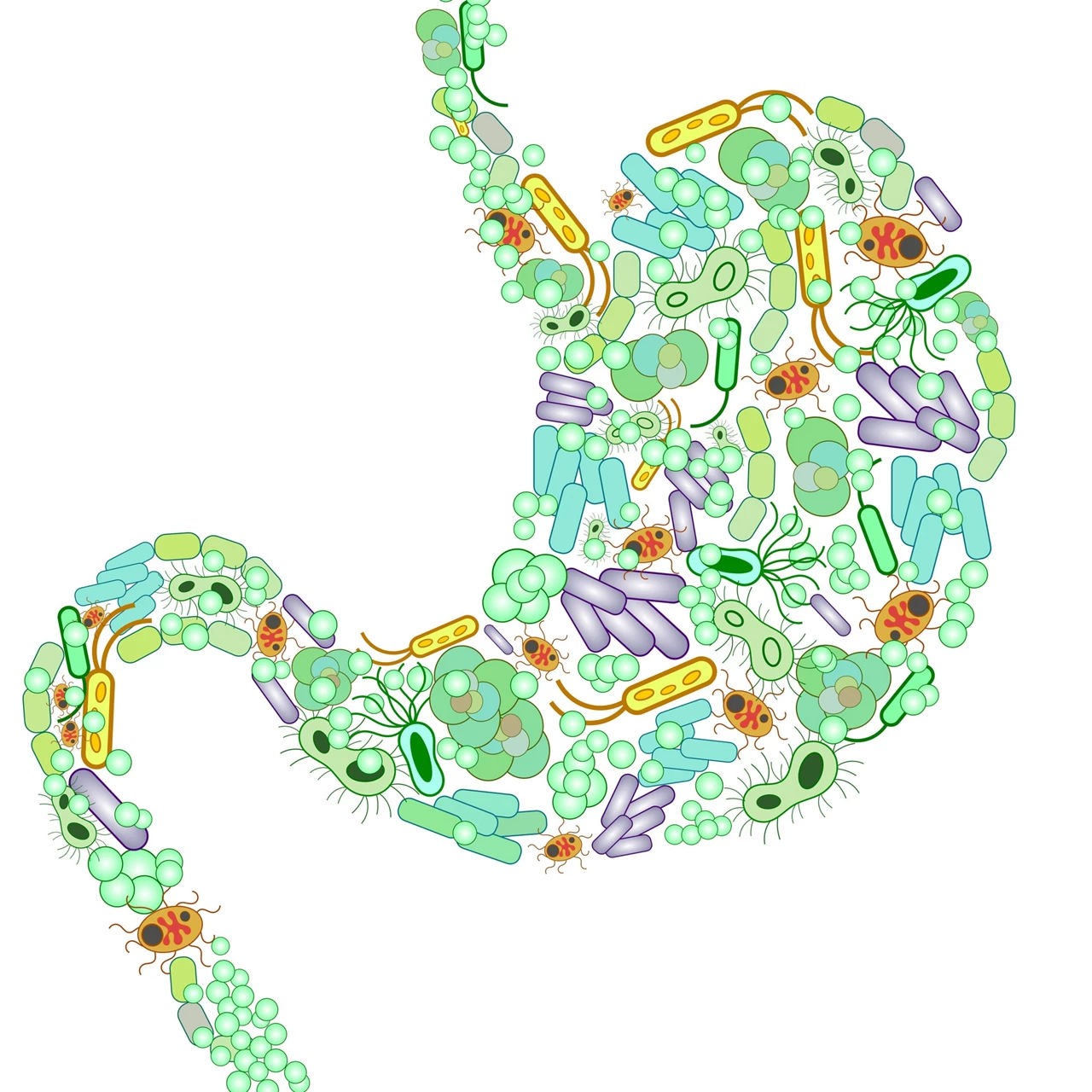The role of the gut microbiome: supporting infant immune system development
The influence and role of the gut microbiome in infants’ immune system development is becoming ever clearer. From birth, the composition of an infant’s gut microbiome is highly influenced by nutrition and a healthy, balanced gut microbiome plays an essential role in the function and development of the gut. Pre-, pro- and postbiotics help to support and maintain overall health by improving the composition of the gut microbiome, stimulating good gut and immune system function.

Please log in to access this content
Simply log in or register to Nutricia Academy today to access this content as well as a host of other trusted education resources.

Nutricia has over 40 years of experience in breastmilk and gut health research – Dr Jan Knol, Director of Gut Biology & Microbiology, Danone Nutricia Research, Utrecht and Singapore, and Professor of Intestinal Microbiology of Early Life, Wageningen University, The Netherlands, provides an expert view with insights on how the microbiome affects early and lifelong health.
Why are gut bacteria so important to health?
Humans are teeming with microorganisms and the digestive system plays host to many of them. The gut is home to around 100 trillion bacteria1 which, alongside other microorganisms such as viruses and fungi, make up the gut microbiome. Gut bacteria also supply us with vitamins like biotin and vitamin K, and our digestive system cannot function effectively without bacteria. But bacteria and their metabolites in the gut microbiome are not just involved in digestion – they also play a vital role in metabolism, immunity and cognitive function2. In infancy, in particular, gut bacteria are involved in gut development, supporting gut function, strengthening the immune system, and even have the potential to lower the risk of disease in infancy and beyond3.
How are gut and immune system development linked in infants?
An important part of our immune system is in the gut. A healthy gut is associated with a diverse, balanced, stable, well-functioning microbial ecosystem, which plays a fundamental role in the development, education and function of the host immune system. As well as trillions of bacteria, the gut contains as much as 70-80% of the human body’s immune cells4. In infants, the gut microbiome affects the development and function of the immune system in several ways. It influences both the innate and adaptive immune system (for example, bacterial metabolites, such as short-chain fatty acids, regulate macrophage function), promotes mucosal immunity by helping establish and regulate the intestinal surface, and provides direct and indirect defence against pathogens3,5,6. All the evidence suggests that a healthy gut and a healthy gut microbiome are essential for optimal immune system development and function in infants3.
What are the characteristics of a healthy gut microbiome?
Every person’s microbiome is unique but, in general, a healthy microbiome is a diverse ecosystem with low levels of pathogens and high levels of beneficial bacteria. There aren’t specific bacteria that a healthy individual ‘should’ have in their gut; bacteria are adaptable and have been shown to undertake different functions, depending on individual microbiome composition7. We are still learning about this fascinating miniature world, and how babies’ microbiomes differ from those of adults. For example, breastfed babies tend to have gut microbiomes that are less complex and are dominated by beneficial bifidobacteria, which support immune function8. In the first 1,000 days, babies move from a protected environment to one where they are exposed to lots of immune challenges, which helps the immune system to learn and adapt3. There is increasing evidence to support the so-called ‘hygiene hypothesis’ that exposure to bacteria is good for us and that if we remained in a sterile environment throughout childhood, our body’s immune system would not be able to function nearly as well.
What are the indicators of a healthy gut microbiota in infants?
The only way you can really see gut microbiota composition is by analysing a faecal sample – this is done in formal studies of the microbiome – but we don’t need a microscopic analysis to recognise some of the signs that an infant’s gut is healthy, such as soft, frequent stools that do not cause discomfort when passed. In fact, a parent’s ‘gut instinct’ may well be right; a generally ‘settled’ infant that rarely suffers from colic, is more likely to have a healthy gut microbiota than an infant that is less ‘settled’ and seems to have difficulty when defecating.
What are the most important influencers of microbiome composition?
There are a lot of studies looking at what influences gut microbiome development in infants. Composition appears to be influenced by factors such as gestational age (pre-term babies’ microbiomes differ from full-term babies’), delivery (vaginal or surgical birth), maternal stress levels (higher stress levels result in less diverse microbiomes), nutrition, and antibiotic use, but the impact of these factors varies9,10. Early nutrition is the main influence on the composition of initial colonising bacteria. It fine-tunes the immune system and sets up metabolic homeostasis in early life – influencing long-term metabolic health and immune resilience2,3.
How does breastmilk support a healthy gut?
Breastmilk is the best possible source of nutrition for an infant and its healthy microbiome. It contains a range of bioactive components including live bacteria, immune cells, metabolites and human milk oligosaccharides (HMOs), which are prebiotics for specific infant gut bacteria such as Bifidobacterium.
Nothing compares to breastmilk; every feed is individually tailored to a baby’s particular needs, and it adapts as they grow and develop. This can’t be replicated, but the more we find out about breastmilk composition, the better job we can do. Nutricia’s extensive research into breastmilk, and how it affects gut development, aims to provide babies that are not exclusively breastfed with the best possible start.
What are the benefits of pro-, pre- and postbiotics?
Probiotics are live microorganisms that, when administered in adequate amounts confer a health benefit to the host11. Prebiotics are food for beneficial bacteria; they promote the growth of beneficial bacteria (such as bifidobacteria)12. Postbiotics are bioactive compounds produced by micro-organisms during a fermentation process13,14,15. Postbiotics can be proteins, lipids, carbohydrates, vitamins, organic acids, cell wall components and other complex molecules15. Specific postbiotics have great potential for early life nutrition by helping modulate the gut microbiota and exerting immunomodulatory effects14,16.
Are pre- and postbiotics beneficial for infants?
In order to support gut function closer to breast-fed infants, prebiotics have been developed for use in infant formula. Nutricia was the first company to include prebiotic oligosaccharides in our infant formulas. The most studied prebiotic mixture is our patented scGOS/lcFOS (9:1), which contains short-chain galacto-oligosaccharides and long-chain fructo-oligosaccharides in a 9:1 ratio.
Infant formulas enriched with this prebiotic mixture have demonstrated a wide range of gut and immune benefits, compared with formulas without added prebiotics17-19. Infants fed formula with added scGOS/lcFOS (9:1) have been shown to have gut microbiomes closer to breastfed infants, compared with standard formula-fed infants20.
There is increasing interest in postbiotics because of their wide-ranging potential benefits for human health. Different postbiotic compounds have been shown to have anti-inflammatory, antimicrobial, and immunomodulatory properties15. To harness these potential benefits for the developing infant, postbiotics may be added to infant formula. This is done by partially fermenting the formula with specific strains of bacteria under carefully controlled conditions.
To extend the benefits of human milk to bottle-fed babies, we have developed the next generation of infant nutrition, bringing together our two pioneering innovations. This is the first and only infant formula combining pre- and postbiotics. In clinical trials, the new formula has been shown to be well tolerated and to have positive effects on many aspects of gut and immune system functioning compared with formulas without pre- and postbiotic supplementation21,22. Overall, the new infant formula combining scGOS/lcFOS (9:1) and our unique postbiotics has been shown to promote a more favourable gut environment and gut microbiota composition and activity, with a faecal metabolite profile closer to breast-fed infants, all of which support the healthy development and functioning of a resilient immune system3,5,21,22.
Finally, can gut health in infancy really affect lifelong health?
Microbial imbalance – known as dysbiosis – can cause health problems throughout life. Dysbiosis can influence biological processes in the gut and throughout the body. Conversely, a healthy microbiome in infancy is associated with good digestive health, optimal brain and immune system development and improved overall health3,5,23.
An increasing body of evidence suggests that poor nutrition during the first 1,000 days of life may increase the risk of developing non-communicable diseases, such as asthma, diabetes, obesity and heart disease, later in life24. Optimal nutrition during pregnancy and the first two years of life can have a profound effect on a child’s development25. Early life nutrition impacts physical growth, cognitive development, immune maturation, development of digestive systems, not to mention socialisation and the development of healthy eating habits25. At Danone Nutricia Research, we strive to provide optimal nutrition for each stage of development, to support a healthy start in life.
- Mitsuoka T. Intestinal flora and aging. Nutr Rev 1992; 50: 438-46
- Nash MJ, Frank DN, Friedman JE. Early Microbes Modify Immune System Development and Metabolic Homeostasis—The “Restaurant” Hypothesis Revisited. Front Endocrinol 2017; 8: 349
- Wopereis H, Oozeer R, Knipping K et al. The first thousand days – intestinal microbiology of early life: establishing a symbiosis. Am J Physiol 2014; 25: 428-438
- Furness JB, Kunze WA, and Clerc N. Nutrient tasting and signaling mechanisms in the gut. II. The intestine as a sensory organ: neural, endocrine, and immune responses. Am J Physiol 1999; 277: G922-G928
- Martín R, Nauta AJ, Amor KB et al. Early life: gut microbiota and immune development in infancy. Benef Microbe 2010; 1: 367-82
- Oozeer R, Rescigno M, Ross RP et al. Gut health: predictive biomarkers for preventive medicine and development of functional foods. Br J Nutr 2010 May; 103(10): 1539-44
- Bull MJ, Plummer NT. Part 1: The Human Gut Microbiome in Health and Disease. Integrative Medicine: A Clinician’s Journal 2014; 13(6): 17-22
- Gueimonde M, Laitinen K, Salminen S et al. (2007) Breastmilk: a source of bifidobacteria for infant gut development and maturation? Neonatology 92, 64–66
- Palmer C, Bik EM, DiGiulio DB et al. Development of the Human Infant Intestinal Microbiota. PLOS Biology 2007; 5(7): e177
- Yang I, Corwin EJ, Brennan PA et al. The Infant Microbiome: Implications for Infant Health and Neurocognitive Development. Nursing Res 2016; 65(1): 76-88
- Hotel AC, Cordoba A. Health and nutritional properties of probiotics in food including powder milk with live lactic acid bacteria. Prevention. 2001 Oct 1;5 (1):1-0
- Gibson GR, Hutkins R, Sanders ME et al. Expert consensus document: the international scientific association for probiotics and prebiotics (ISAPP) consensus statement on the definition and scope of prebiotics. Nat Rev Gastroenterol Hepatol 2017; 14(8): 491-502
- Patel R, Denning P W. Therapeutic Use of Prebiotics, Probiotics, and Postbiotics to Prevent Necrotizing Enterocolitis. What is the Current Evidence? Clin Perinatol 2013; 40(1): 11-25
- Tsilingiri K, Rescigno M. Postbiotics: what else? Benef Microbe 2013; 4(1): 101-107
- Aguilar-Toalá JE, García-Varela R, García HS et al. Postbiotics: An evolving term within the functional foods field. Trends Food Sci Technol 2018; 75: 105-114
- Walker WA, Iyengar RS. Breast milk, microbiota, and intestinal immune homeostasis. Pediatr Res 2014 13; 77(1-2): 220-22
- Scholtens PAMJ, Goossens DAM, Staiano A. Stool characteristics of infants receiving shortchain galacto-oligosaccharides and long-chain fructo-oligosaccharides: A review. World J Gastroenterol 2014; 20(37): 13446-13452
- Arslanoglu S, Moro GE, Schmitt J et al. Early dietary intervention with a mixture of prebiotic oligosaccharides reduces the incidence of allergic manifestations and infections during the first two years of life. J Nutr 2008; 138(6): 1091-1095
- Bruzzese E, Volpicelli M, Squeglia V et al. A formula containing galacto- and fructooligosaccharides prevents intestinal and extra-intestinal infections: An observational study. Clin Nutr 2009; 28: 156–161
- Haarman M, Knol J. Quantitative real-time PCR assays to identify and quantify fecal bifidobacterium species in infants receiving a prebiotic infant formula. Appl Environ Microbiol 2005; 71(5): 2318-2324
- Tims S, Roeselers G, Knol J. Gut microbiota composition modulation by partly fermented infant formulae supplemented with prebiotics scGOS/lcFOS. Abstract presented at ESPGHAN meeting 2018
- Rodriguez-Herrera A, Tims S, Polman J et al. A partly fermented infant formula with prebiotics scGOS/lcFOS modulates the gut microbiota functioning towards a more breastfed-like microbiota. Abstract presented at ESPGHAN meeting 2018
- Gerritsen J, Smidt H, Rijkers GT, de Vos WM. Intestinal microbiota in human health and disease: the impact of probiotics. Genes Nutr. 2011; 6: 209–240
- Scientific Advisory Committee on Nutrition. The influence of maternal, fetal and child nutrition on the development of chronic disease in later life. London, 2011
- Why Thousand days. Available at: http://thousanddays.org/the-issue/why-1000-days/ (last accessed July 2018)



